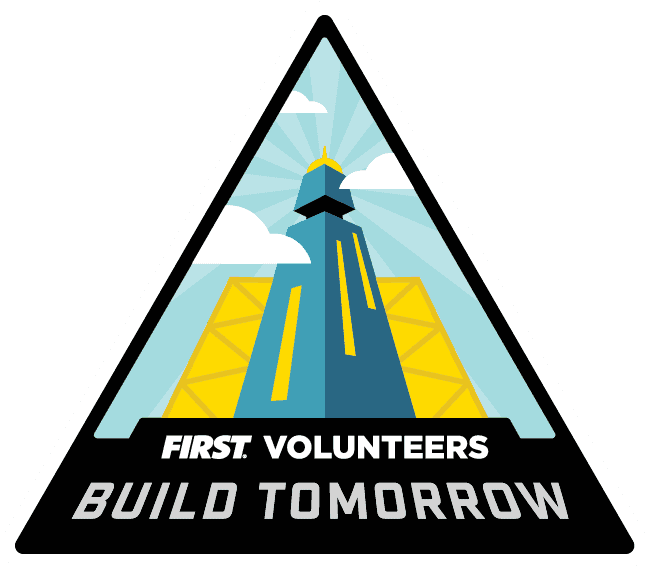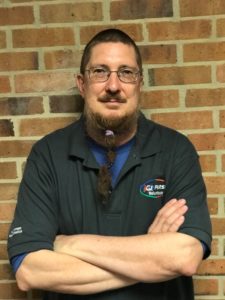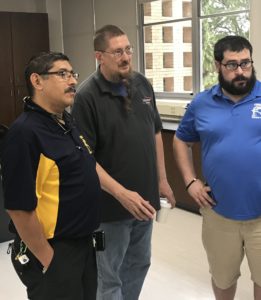
- About
- News
- Programs
- Grants
- Events
- Register
- Resources
- Donate


 Being a Volunteer Coordinator (VC) is a rewarding experience. You can enjoy the community FIRST volunteer programs create and gain experience in the tasks or skills you love. But what precisely does it mean to be a Volunteer Coordinator with FIRST?
Being a Volunteer Coordinator (VC) is a rewarding experience. You can enjoy the community FIRST volunteer programs create and gain experience in the tasks or skills you love. But what precisely does it mean to be a Volunteer Coordinator with FIRST?
We interviewed Joseph Beckman, one of our San Antonio VC’s to learn what the best aspects of taking on the volunteer coordinator role include, what it’s like to take on the role, and what the experience can offer you. Many of our volunteer coordinators start as volunteer judges at events or hear about our organization through word-of-mouth.
After getting involved with our community in the San Antonio area, Joseph found himself taking on the role of a Volunteer Coordinator. He said, “I knew that our FIRST LEGO League (FLL) Program Coordinator was busy and the current Volunteer Coordinator was leaving. I was hoping to fill a gap, and that selling a great product (FIRST programs) would be a snap.”
According to Joseph, the best way to look at the role is to see the three parts of coordinating volunteers. First, of course, is coordinating and managing the volunteers. “This is making assignments, notifying volunteers when they are assigned, whether they need to complete some ‘paperwork,’ and thanking them for volunteering after the event,” he specified. “Sometimes I have to use some of my own role knowledge, to show them that they can handle what seems to be a more demanding role (like referee or judge).” FIRST provides organizational tools and programs to help make managing details simpler.
Secondly, Volunteer Coordinators need to communicate with the event coordinator and make sure there are plenty of volunteers. Coordinators need to, “let the event organizational team know how many volunteers have signed up, and if it looks like the event is sufficiently staffed. Sometimes this requires re-doing your assignments to accommodate changes.”
The third portion of a volunteer coordinator’s work is to find new volunteers and build a network of reliable, engaged volunteers. “Encouraging is usually done through emails, alerting previous volunteers to upcoming events, showing appreciation, and thanking them for the time they have spent on FIRST and the children,” one of our volunteer coordinators advises. “Finding new volunteers might be a neighbor who gets interested, encouraging coaches to ask parents of team members, talking to organizations or manning a table at an outreach and talking to people who stop by.”
All in all, some of the most valuable skills for being a successful volunteer coordinator are computer skills, being good at managing details, and being a people person.

Volunteering makes the community stronger, and volunteering with FIRST helps bring science and robotics into more communities. But it can be just as rewarding and fun for the volunteers as for the students. Joseph recalls the first time he knew he’d found the right place to volunteer:
“At my first event as a volunteer, I was judging FIRST Tech Challenge (FTC) teams, a number of which had put a lot of time and effort into their presentation. One team, though, stood out. They were personable and knowledgeable like other teams, but with the team leader went to introduce the next team member to speak, she prefaced it with “My friend Antonio will now tell you about…” “My Friend?” I was hit with the sudden realization that this was the type of team that I wished I could be on at work!”
FIRST is always looking for enthusiastic volunteers who want to judge, referee, and have fun. Joining can be as simple as hearing about the opportunity. “I was attending my daughter’s FLL Qualifying Tournament, and the Emcee announced that they were looking for volunteers. I went down during lunch and talked with him and he told me to go to www.firstinspires.org and how to find other events. I wound up volunteering the next weekend at an FTC event as a judge. I got to talk with the teams, and they were marvelous. I liked seeing the progression of robots and students from FLL to FTC, and just volunteered whenever I could after that.”
It’s just a matter of filling out the form. From there, you can judge, referee, or coordinate with other like-minded volunteers to help FIRST programs in Texas grow. “It’s a great time to try something new and stretch what you think you can do, especially if your area has an established VC. This helps to lessen the burden of learning new skills as the only person with that responsibility, and lets you gradually step into the role as much as you want. The good thing about FIRST, is if you decide you are not ready for a role, there are plenty other volunteer opportunities that fit your current skills and availability.”